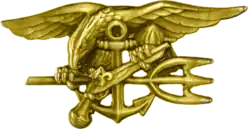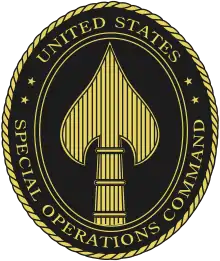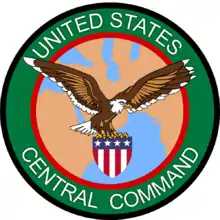Albert M. Calland III
Albert Melrose Calland III (born 1952) is a retired United States Navy Vice Admiral who was the Deputy Director for Strategic Operational Planning at the National Counterterrorism Center and commander of Naval Special Warfare Command from 2002 to 2004. He also previously served as Deputy Director of the Central Intelligence Agency from July 2005 to July 2006 and commanded the Naval Special Warfare Development Group from 1997 to 1999.
Albert M. Calland III | |
|---|---|
 Calland in the mid-2000s | |
| Born | 1952 (age 68–69) |
| Allegiance | |
| Service/ | |
| Years of service | 1974–2007 |
| Rank | |
| Commands held | SEAL TEAM ONE Naval Special Warfare Command Naval Special Warfare Development Group |
| Awards | Navy Distinguished Service Medal Defense Superior Service Medal Legion of Merit Bronze Star Medal |
| Website | http://www.navy.mil/navydata/bios/navybio.asp?bioID=65 |
Calland is a former commander of Seal Team Six and was the first U.S. military flag officer to set foot in Afghanistan after the September 11 attacks.[1]
Naval career
Calland graduated from the United States Naval Academy with a Bachelor of Science degree in 1974 and subsequently graduated from Basic Underwater Demolition/SEAL Training (BUD/S) class 82 in 1975. Calland served as a Platoon Commander of a SEAL Delivery Vehicle (SDV) platoon and a SEAL Platoon, Instructor BUD/S Training and Naval Special Warfare/Explosive Ordnance Disposal Officer. Calland served as assault group leader with SEAL Team SIX followed by assignment as executive officer of Special Boat Unit 12 in 1987. He deployed as part of Operation Earnest Will in the Persian Gulf. Calland took command of SEAL Team ONE from November 1992 until January 1995. He later went on to receive a Master of Science degree in national resource strategy from the Industrial College of the Armed Forces in 1996. From June 1997 until June 1999, Calland commanded the Naval Special Warfare Development Group.[2] Calland was the commanding officer of Special Operations Command Central (SOCCENT), part of United States Central Command, and as such, commanded efforts in Afghanistan in 2001 during Operation Enduring Freedom.[3] Between August 2002 and March 2004, Calland served as the commanding officer of the Naval Special Warfare Command. Calland's career at the Central Intelligence Agency began with his appointment to the position of Associate Director of Central Intelligence for Military Support in March 2004, a position he filled until his appointment as Deputy Director. Calland resigned from that position upon the confirmation of CIA Director General Michael Hayden, as a 1953 amendment to the National Security Act of 1947 prevents the Director and Deputy Director from serving in the military simultaneously.
After leaving the CIA, Calland served for a year as Deputy Director for Strategic Operational Planning at the National Counterterrorism Center (NCTC). He retired from the Navy on July 1, 2007 after 33 years of service becoming Executive Vice President for Security and Intelligence Integration with CACI International Inc.[4]
Awards and decorations
|
| ||||||||||||||||||||||||||||||||||||||||||||||||
References
- "Retired Navy vice admiral, Zanesville graduate honored at ceremony". Retrieved 2019-06-15.
- "Interior Nominee Promotes Navy SEAL Career, While Playing Down 'Bad Judgment'". The New York Times. 2017-01-16. Retrieved 2017-01-18.
- "Archived copy". Archived from the original on 2012-03-26. Retrieved 2011-06-26.CS1 maint: archived copy as title (link)
- "News Release 8/13/07". CACI. 2007-08-13. Retrieved 2014-05-01.
External links
| Wikimedia Commons has media related to Albert Calland. |
| Government offices | ||
|---|---|---|
| Preceded by John Edward McLaughlin |
Deputy Director of the Central Intelligence Agency July 15, 2005 – July 23, 2006 |
Succeeded by Stephen R. Kappes |




